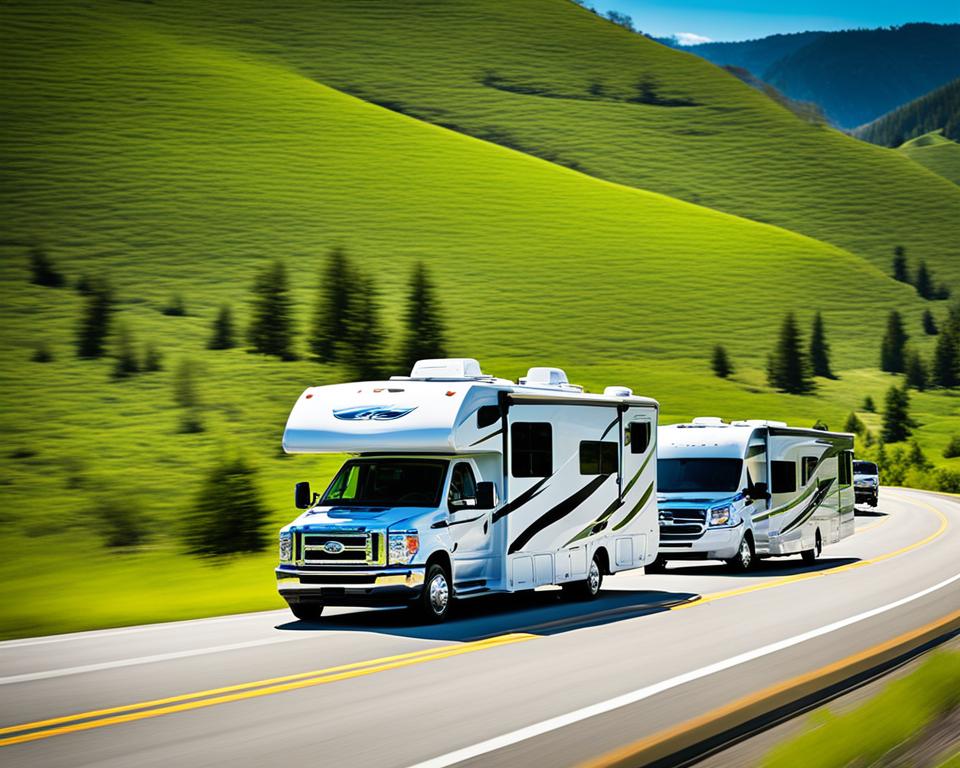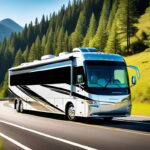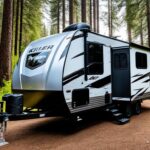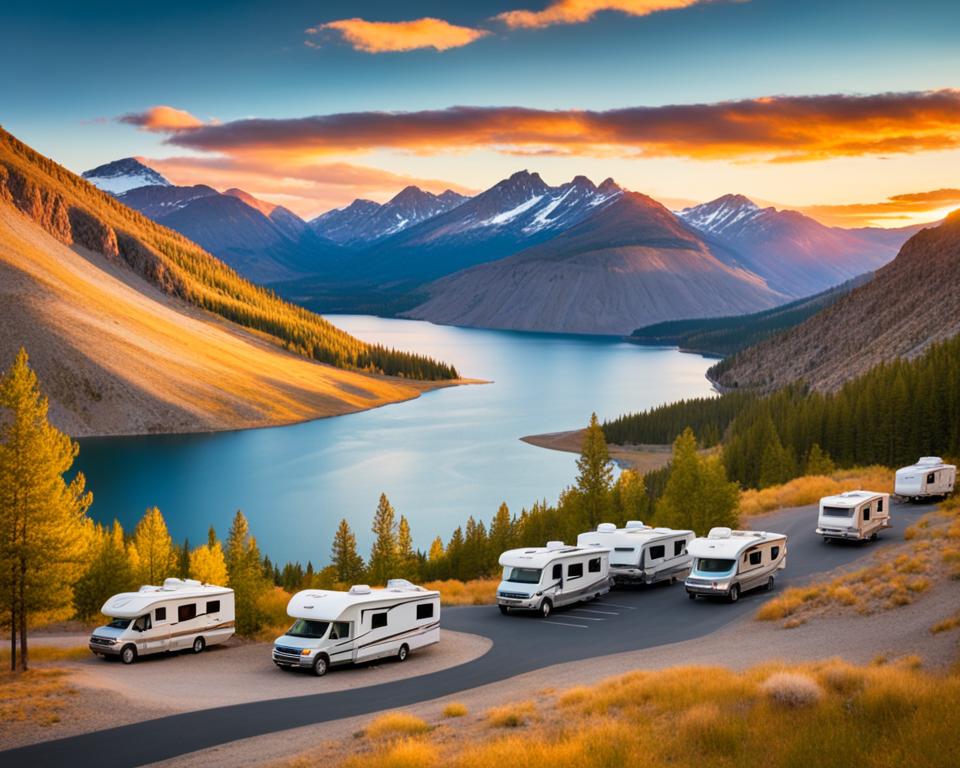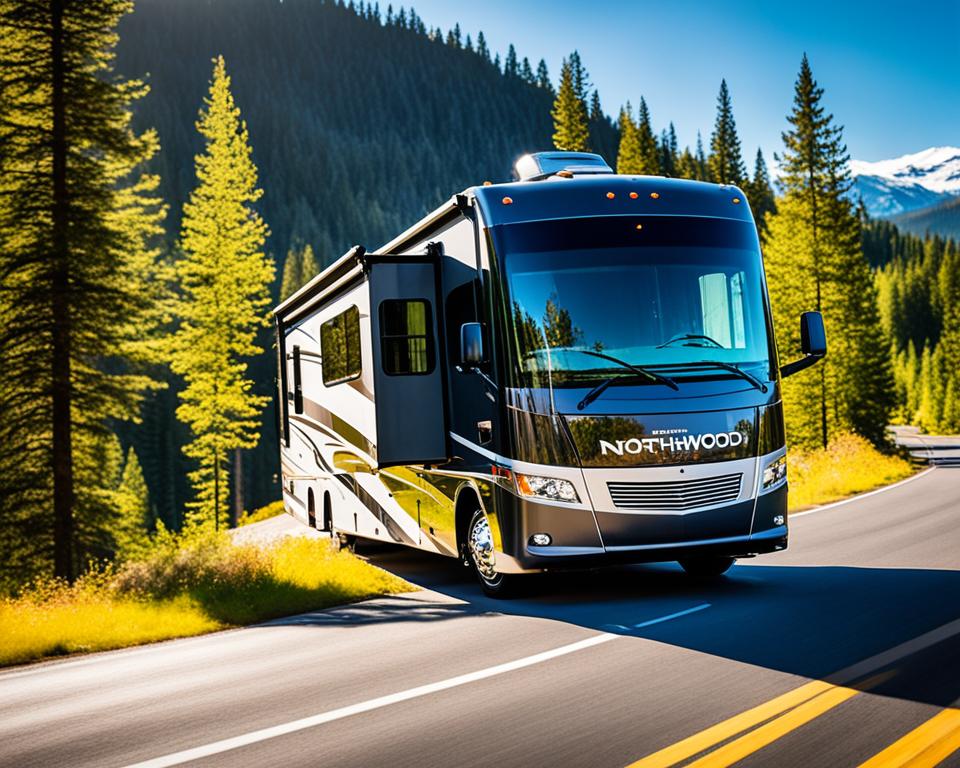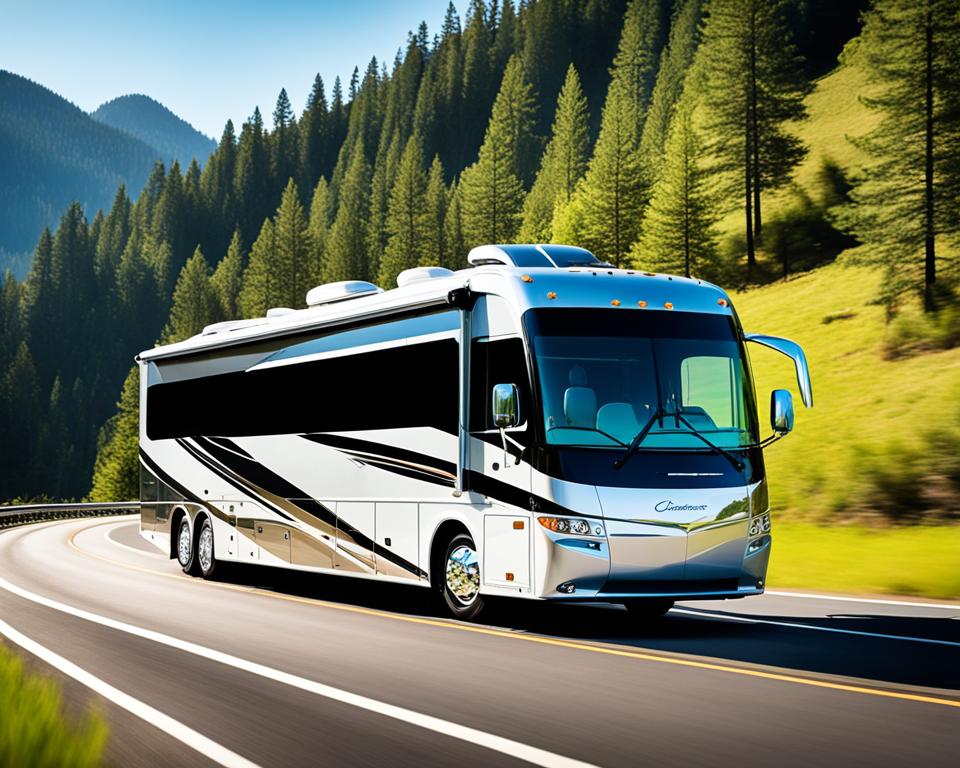Fuel-efficient RVs are a great option for those looking to save on fuel costs and reduce their environmental impact. While Class C RVs are often associated with lower fuel efficiency, there are models available that prioritize fuel economy without compromising on comfort or functionality. In this article, we will explore the features that contribute to a fuel-efficient Class C RV and provide a list of the best options currently on the market.
Key Takeaways:
- Choosing a fuel-efficient Class C RV can help you save money on fuel costs.
- Factors such as size, weight, and aerodynamics influence the fuel efficiency of Class C RVs.
- Diesel-powered Class C RVs generally offer better mileage compared to gasoline models.
- Smaller and lighter Class C RVs tend to have better gas mileage.
- Taking steps to improve overall RV fuel efficiency, such as regular maintenance and mindful driving habits, can also make a difference.
Factors affecting fuel mileage in RVs
When it comes to fuel mileage in RVs, several factors come into play. Understanding these factors can help you make informed decisions when choosing an RV and optimizing its fuel efficiency.
Weight
The weight of an RV is a significant determinant of its fuel consumption. Heavier vehicles require more power to move, resulting in increased fuel consumption. It’s essential to consider the weight of your RV and pack only necessary items to minimize fuel usage and improve mileage.
Size and Aerodynamics
The size and aerodynamics of an RV also play a crucial role in its fuel efficiency. RVs with streamlined and curved designs experience reduced drag, resulting in improved fuel mileage. Consider choosing an RV with aerodynamic features to enhance its fuel efficiency.
Engine Type
The type of engine in an RV, whether gasoline or diesel, can impact its fuel mileage. Diesel engines generally provide better mileage compared to their gasoline counterparts. Diesel fuel has a higher energy density, allowing the engine to extract more energy per gallon. If fuel mileage is a priority, opting for a diesel-powered RV may be a more fuel-efficient choice.
Other Factors
Aside from weight, size, and engine type, several other factors can affect fuel mileage in RVs. These include driving behavior, terrain, and tire pressure. Aggressive driving habits, such as rapid acceleration and excessive braking, can lead to decreased fuel efficiency. Uphill terrains and rough roads can also impact mileage. Additionally, maintaining proper tire pressure helps optimize fuel consumption.
To summarize, fuel mileage in RVs is influenced by various factors including weight, size, aerodynamics, engine type, driving behavior, terrain, and tire pressure. Considering these factors when choosing an RV and adopting fuel-saving practices can help you maximize fuel efficiency and enhance your overall RVing experience.
Average fuel mileage for Class C RVs
When considering the fuel efficiency of Class C RVs, several factors come into play, including size, weight, and engine type. Gasoline-powered Class C RVs typically have lower mileage, ranging from 6 to 10 miles per gallon. On the other hand, diesel-powered Class C RVs offer higher mileage, averaging around 15 to 18 miles per gallon. Please note that these figures are approximate and can vary based on individual RV models and driving conditions.
If you’re looking for a Class C RV that offers better fuel efficiency, opting for a diesel engine may be a good choice. With their efficient fuel consumption, diesel-powered RVs can provide longer trips and reduce overall fuel costs. However, it’s essential to consider other factors such as maintenance and vehicle cost before making a decision.
If fuel efficiency is a priority for you, it’s worth exploring the options available among Class C RVs and selecting a model that meets your requirements without compromising on mileage.
Gasoline-powered Class C RVs
Gasoline-powered Class C RV engines are typically less fuel-efficient compared to their diesel counterparts. These RVs generally have lower mileage, ranging from 6 to 10 miles per gallon. However, if you’re planning shorter trips or have a lower budget, they can still provide a comfortable travel experience.
Diesel-powered Class C RVs
Diesel-powered Class C RVs are known for their better fuel efficiency and mileage performance. These RVs can achieve higher mileage, averaging around 15 to 18 miles per gallon. If you’re planning longer trips or prioritize fuel economy, a diesel-powered Class C RV may be a more suitable choice.
Remember, when it comes to fuel mileage for Class C RVs, it’s important to consider your specific travel needs and preferences. Whether you prioritize fuel efficiency or other features, there are Class C RV models available in the market to suit a range of requirements.
| RV Model | Engine Type | Fuel Mileage (MPG) |
|---|---|---|
| Winnebago Fuse | Ford Transit 350 HD | 14-19 |
| Phoenix USA Model 2350 | Ford E350-V10 | 10.5 |
Best gas mileage Class C RVs
When it comes to Class C RVs with the best gas mileage, smaller and lighter models tend to offer better efficiency. These compact and nimble RVs are designed to optimize fuel consumption without compromising on comfort and amenities. Here are two popular options known for their exceptional mileage:
-
Winnebago Fuse
The Winnebago Fuse, built on the Ford Transit 350 HD chassis, is a standout when it comes to fuel efficiency. With its sleek design and engineering innovations, this Class C RV can achieve an impressive mileage of up to 14 to 19 miles per gallon. It combines smart aerodynamics, a lightweight construction, and an efficient engine to deliver an eco-friendly and budget-friendly travel experience. The Winnebago Fuse also offers a range of features and floor plans to suit different travel preferences.
-
Phoenix USA Model 2350
Another top contender for best gas mileage in the Class C RV category is the Phoenix USA Model 2350. Built on the Ford E350-V10 chassis, this RV offers a winning combination of performance and fuel efficiency. With an average mileage of around 10.5 miles per gallon, it ensures you can enjoy long journeys without worrying about frequent refueling stops. The Phoenix USA Model 2350 is known for its thoughtful design, quality craftsmanship, and spacious interiors, making it a popular choice among RV enthusiasts.
When considering the best gas mileage Class C RVs, it’s essential to evaluate your specific travel needs, lifestyle, and budget. While these options provide excellent fuel efficiency, it’s important to consider other factors such as floor plan layout, amenities, and overall functionality to choose the RV that best suits your requirements.
Diesel vs. gas mileage in Class C RVs
When it comes to fuel efficiency in Class C RVs, the choice between diesel and gas can have a significant impact. Diesel-powered Class C RVs generally offer better mileage compared to their gas counterparts. The efficiency of diesel engines, combined with their higher torque, can contribute to improved fuel economy, allowing you to travel longer distances on a single tank of fuel.
On the other hand, gasoline-powered Class C RVs are typically more affordable upfront, making them an attractive option for those on a tighter budget. However, it’s important to note that these models tend to have lower mileage compared to their diesel counterparts. This means you may need to make more frequent fuel stops and spend more on gasoline over time.
When making a decision between diesel and gas-powered Class C RVs, it’s crucial to consider the overall cost of ownership. While diesel models may have better mileage, they often come with a higher initial price tag. Additionally, diesel engines may require more expensive maintenance and repairs. Gasoline, on the other hand, is generally more readily available than diesel fuel, making it easier to refuel during your travels.
Comparing Diesel and Gas Mileage in Class C RVs
| RV Model | Fuel Type | Mileage (MPG) |
|---|---|---|
| Winnebago View 24J | Diesel | 19 |
| Coachmen Freelander 27QB | Gasoline | 10 |
| Jayco Melbourne 24L | Diesel | 17 |
| Thor Four Winds 28Z | Gasoline | 8 |
As shown in the table above, diesel-powered Class C RVs generally have higher mileage compared to gasoline-powered models. However, it’s essential to research specific RV models and consult with dealerships to get accurate mileage estimates for your chosen models.
Ultimately, the choice between diesel and gas mileage in Class C RVs depends on your budget, travel preferences, and specific needs. Consider factors such as fuel costs, maintenance expenses, and availability of fuel when making your decision.
Tips for improving RV fuel efficiency
Improving the fuel efficiency of your RV not only saves you money on fuel costs but also reduces your carbon footprint. Here are some fuel-saving tips for RVs:
- Maintain your RV: Regular maintenance is crucial for optimizing fuel usage. Schedule regular tune-ups and ensure your tires are properly inflated to improve efficiency.
- Avoid excessive idling: Excessive idling wastes fuel. When parked, turn off the engine to conserve fuel and reduce emissions.
- Drive at moderate speeds: Driving at a moderate speed not only improves safety but also helps maximize fuel efficiency. Avoid rapid acceleration and maintain a steady pace.
- Utilize cruise control: Using cruise control on highways can help maintain a consistent speed, reducing unnecessary fuel consumption and promoting better mileage.
- Reduce weight: Packing lighter and removing unnecessary items from your RV can significantly improve fuel efficiency. Every extra pound adds strain on your engine and reduces mileage.
“By implementing these fuel-saving tips, RV owners can enjoy their travels while minimizing their impact on the environment.”
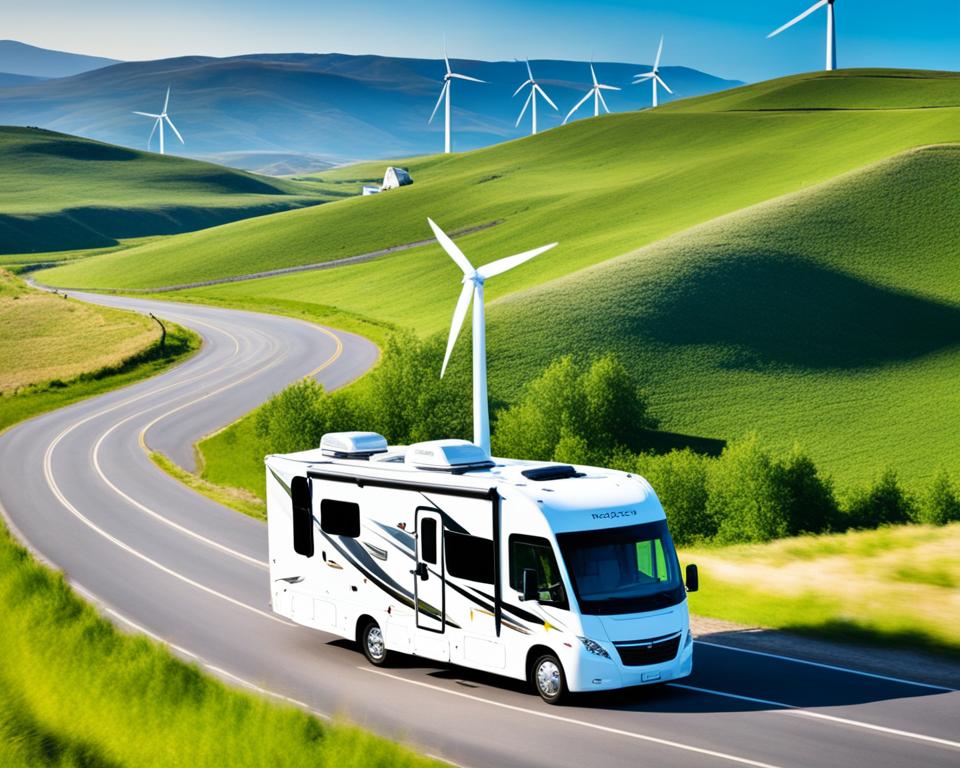
Optimizing fuel efficiency for your RV not only benefits your wallet but also helps protect the environment. By following these tips, you can enjoy cost-effective and eco-friendly adventures on the road.
The future of fuel-efficient RVs
As the demand for more environmentally-friendly vehicles grows, the future of fuel-efficient RVs is heading towards advancements in electric and hybrid technology. While electric-powered RVs are not yet widely available, there are already a few models on the market that are paving the way for a more sustainable RVing experience.
Electric-powered RVs offer several advantages over traditional gasoline or diesel-powered models. Firstly, they have the potential for zero-emission travel, reducing the carbon footprint and contributing to cleaner air quality. Additionally, these RVs benefit from reduced fuel consumption, saving travelers money on gas or diesel expenses. Lower operating costs, thanks to the simplicity of electric powertrains compared to internal combustion engines, can also be expected.
Although the electric RV market is still in its early stages, it is rapidly evolving. Major RV manufacturers are starting to embrace electric technology, and we can expect to see more electric-powered RV options in the future. These future models will likely feature improved battery technology for extended range, faster charging capabilities, and enhanced amenities to provide a comfortable and convenient travel experience without sacrificing sustainability.
With the development of electric and hybrid RVs, RV enthusiasts can look forward to a future where they can explore the great outdoors while minimizing their impact on the environment. The transition to electric-powered RVs is an exciting prospect, offering a sustainable alternative to traditional RVs without compromising on comfort and convenience.
Conclusion
Fuel efficiency is an important consideration when choosing an RV, whether you’re planning a cross-country road trip or exploring the great outdoors. Class C RVs, although not as fuel-efficient as their smaller counterparts, still offer viable options for those seeking a balance between comfort and mileage. By taking into account factors such as weight, size, engine type, and driving habits, you can select a Class C RV that meets your needs while minimizing fuel consumption.
While it’s true that fuel-efficient Class B models tend to have better mileage, Class C RVs can still provide good fuel economy with the right choices. Some Class C RVs, such as the Winnebago Fuse on the Ford Transit 350 HD chassis and the Phoenix USA model 2350 on the Ford E350-V10 chassis, offer impressive mileage figures.
When making your decision, prioritize sustainability and choose a fuel-efficient RV that aligns with your travel goals. Remember to maintain regular vehicle maintenance, optimize tire pressure, practice moderate driving speeds, and reduce unnecessary weight in your RV to further enhance fuel efficiency. By doing so, you can enjoy your adventures while making conscious choices that benefit both your budget and the environment.
FAQ
Are Class C RVs fuel-efficient?
Class C RVs can vary in fuel efficiency depending on factors such as size, weight, and aerodynamics. Smaller and lighter models tend to offer better efficiency, but overall, Class C RVs are not as fuel-efficient as smaller Class B models.
What factors affect fuel mileage in RVs?
Several factors can affect the fuel mileage of RVs, including weight, size, aerodynamics, engine type, driving behavior, terrain, and tire pressure.
What is the average fuel mileage for Class C RVs?
The average fuel mileage for Class C RVs can vary depending on the size, weight, and engine type. Gasoline-powered Class C RVs tend to have lower mileage, ranging from 6 to 10 miles per gallon. Diesel-powered Class C RVs can achieve a higher mileage of around 15 to 18 miles per gallon.
Which Class C RVs offer the best gas mileage?
Smaller and lighter Class C RVs tend to offer better gas mileage. Some popular options include the Winnebago Fuse on the Ford Transit 350 HD chassis, which can achieve mileage of up to 14 to 19 miles per gallon, and the Phoenix USA model 2350 on the Ford E350-V10 chassis, which averages around 10.5 miles per gallon.
Are diesel-powered Class C RVs more fuel-efficient than gas-powered ones?
Yes, diesel-powered Class C RVs generally offer better mileage compared to their gas counterparts. Diesel engines are more efficient, and their higher torque can contribute to improved fuel economy. However, gas-powered Class C RVs tend to be more affordable.
What can I do to improve the fuel efficiency of my RV?
To improve fuel efficiency, keep your RV well-maintained with regular tune-ups and tire pressure checks. Avoid excessive idling, drive at moderate speeds, and use cruise control on highways. Additionally, reduce weight by packing lighter and removing unnecessary items.
What does the future hold for fuel-efficient RVs?
As the demand for more environmentally-friendly vehicles grows, the future of fuel-efficient RVs is likely to include advancements in electric and hybrid technology. While electric-powered RVs are not yet widely available, there are a few models on the market, offering the potential for zero-emission travel and reduced fuel consumption.

